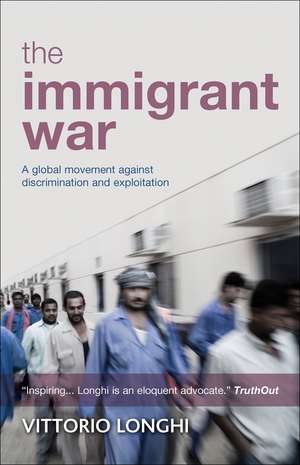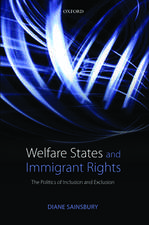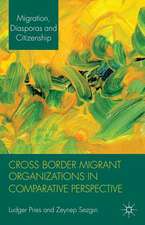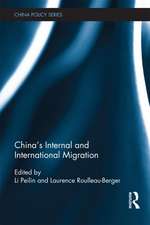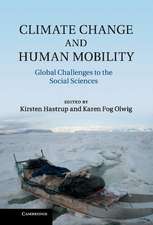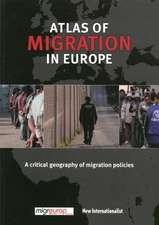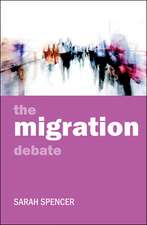The Immigrant War: A Global Movement Against Discrimination and Exploitation
Autor Vittorio Longhi Traducere de Janet Eastwooden Limba Engleză Paperback – 17 iun 2014
From Asian workers abused in the oil-rich Gulf states and Latinos trafficked at the US-Mexico border to African sans papiers exploited in France and sub-Saharan farmhands attacked by organized crime groups in Italy, immigrant communities have faced acute discrimination, exploitation, and violence.
The Immigrant War provides a global and accessible look at the emerging social conflict immigration has evoked. To do so, Vittorio Longhi navigates the conflicting assumptions about many immigrant communities—how they are simultaneously vital social actors fighting for their human rights and passive victims beleaguered by unrelenting antagonism—and exposes the alarmingly absent responses of many governments, which allow these huge populations to falter in a policy vacuum. Sketching this moment in global history as an immigrant war for human rights, citizenship, and equality, Longhi offers a vital rethinking of the immigration policy that needs to be drafted in order to break the chain of exploitation and provide immigrants a viable role in contemporary society.
The Immigrant War provides a global and accessible look at the emerging social conflict immigration has evoked. To do so, Vittorio Longhi navigates the conflicting assumptions about many immigrant communities—how they are simultaneously vital social actors fighting for their human rights and passive victims beleaguered by unrelenting antagonism—and exposes the alarmingly absent responses of many governments, which allow these huge populations to falter in a policy vacuum. Sketching this moment in global history as an immigrant war for human rights, citizenship, and equality, Longhi offers a vital rethinking of the immigration policy that needs to be drafted in order to break the chain of exploitation and provide immigrants a viable role in contemporary society.
Preț: 126.58 lei
Nou
Puncte Express: 190
Preț estimativ în valută:
24.22€ • 24.99$ • 20.21£
24.22€ • 24.99$ • 20.21£
Carte disponibilă
Livrare economică 06-20 martie
Preluare comenzi: 021 569.72.76
Specificații
ISBN-13: 9781447305897
ISBN-10: 1447305892
Pagini: 156
Dimensiuni: 140 x 216 x 10 mm
Greutate: 0.18 kg
Editura: Bristol University Press
Colecția Policy Press
ISBN-10: 1447305892
Pagini: 156
Dimensiuni: 140 x 216 x 10 mm
Greutate: 0.18 kg
Editura: Bristol University Press
Colecția Policy Press
Notă biografică
Vittorio Longhi is an Italian journalist specializing in labor rights. He has written for La Repubblica and the Guardian.
Cuprins
Preface: The war
1. In the Persian Gulf
Return from hell
Who built the country?
A time bomb
The trade union bridge
The tower of Armani and of Athiraman
Like everybody else, like nobody else
2. In the United States
Hermanos en el camino
The work borderline
A nation of immigrants
The Great American Boycott
Intolerable for a democracy
Waiting for reform
3. In France
Beyond the jungle
From the colonies to the banlieues
The sans papiers and the workers
The reserve army in the kitchen
24h sans nous
4. In Italy
The Mediterranean wall
Between amnesty and security
What would happen?
From factories to the crane
The farm labourers’ strike
5. The mobility of labour
Need for governance
Globalisation without development
Where do resources go?
The international political vacuum
Where is Europe?
The potential of the diaspora
Work and citizenship
Notes
Index
Recenzii
“Longhi expertly combines scholarly analysis with sharp reporting, drawing on his detailed knowledge of the global labour movement and trade unionist activism. The material is admirably well-organized and well-assembled. I know of no other book like this.”
“An extraordinary account in its up-front questioning of how our states and societies construct the immigrant and erase the memory of our own migrant origins. This book shows us how laws have become blunt instruments for bland evasions of our obligations.”
“Here is a book which truly takes forward the struggle for social justice. Vittorio Longhi's comprehensive and vivid study reveals a growing international movement that gets negligible coverage in the mainstream press but yet which requires a radical rethink of dominant approaches to immigration, development, and democracy. The Immigrant War introduces us to a new generation of migrants who will shape the world in the aftermath of neoliberalism.”
“Longhi’s book is a good introduction to the subject of global migration. Anyone looking for a steer on other interesting places to go to follow up on his arguments will find plenty in the 130-odd pages of this book. The implicit challenge in his final sentences, that the predicament of the migrant in the modern world allows us the opportunity to reorientate the notion of citizenship away from its association with geographical territory towards the networks of work and the associated rights of workers, is likely to lead in controversial but potentially very stimulating directions.”
